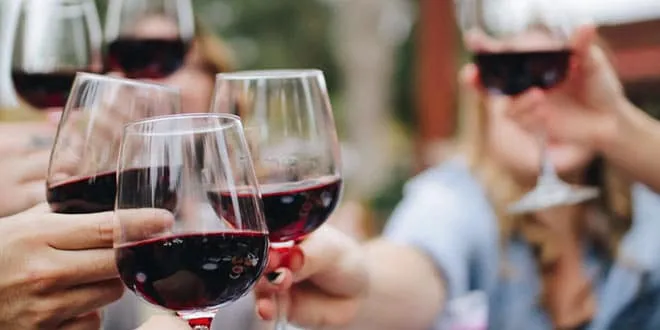By Stephanie Greunke, Registered Dietitian
“Wine Mom” Jokes: More than a Meme?
According to a recent article by the New York Post, alcohol abuse is increasing amongst mothers.(1) The definition of heavy drinking for women is more than 3 (standard-sized) drinks on a single day or 7 drinks per week.(2) That “one glass of wine” you’re pouring for yourself at night might actually count as more than one when compared to a standard serving size. If you go back for a second glass, you can see how it starts adding up. A 2017 study by JAMA Psychiatry states, “Between 2002 and 2013, the number of women who consumed more than four drinks a day rose almost 60 percent, while those meeting the criteria for alcohol use disorders increased by 84 percent.”(3)
This is becoming more than just a light-hearted joke about “momming.”
In a recent social media discussion, many women in the Whole Mamas community shared their stories. “This issue was brought to my attention by my pregnant friend who is a recovering alcoholic. She was nervous about not being able to bond with other mommies because she wasn’t going to be a mom that ends a stressful day with a glass of wine.” – Brianne “I don’t drink wine at all (or any alcohol really, except a good fruity umbrella-topped one on vacation) and sometimes I’ve felt left out because I’m not a ‘wine mom.’ In reality I’m so much happier not feeling like I need a drink every night to get through it.” – Charley “As someone with an alcoholic father… I HATE the ‘wine mom’ culture. Not okay.” – Hayley “Coping by drinking every night is not coping. There’s so much support missing.” – Nichole
Finding the Support You Need
Is it wrong to make light hearted jokes about the stress of motherhood? Of course not. But we need to be going deeper than jokes, asking direct questions and checking in with our friends and loved ones to ensure they are getting the support they need—and not just from a bottle. Studies have shown that mothers who have social support are more likely to have less stress in their role as a mother and have more optimistic views on parenting, which in turn creates healthier, more-well adjusted kids. (4) (5) When you are constantly feeling isolated, stressed, and pessimistic about motherhood, you may be more likely to cope with alcohol. There may be someone in your circle of friends who is silently drinking to excess, but is too afraid to speak up. It might be awkward, but consider starting a conversation with your mama friends about alcohol usage.
Before you open that bottle of wine or can of beer, check in with yourself.
Are you using that drink as a coping mechanism to escape from your life? Has this become habitual to the point where you’re not entirely in control? Is your “mom life” drinking habit getting in the way of your relationships, happiness, or health? If that’s the case, consider embarking on a Whole30 reset specifically designed to help you examine your habits around alcohol, and reach out to the Whole30 Mamas community on social media, via email, or in a DM for support. It’s okay to reward yourself after a long day of parenting and/or working! Before reaching for the bottle, however, ask yourself, is there a different way to reward myself? You might find that making a cup of herbal tea and sitting outside having a quiet moment to yourself helps you unwind even better. You could also call a friend, take 15 minutes to read a book, soak in an Epsom salt bath, or go for a walk around the block. Ultimately, giving yourself the space to sit with your uncomfortable feelings is more helpful in the long run than anything you’re doing to numb or push them down. It’s also smart to seek professional help from a trusted counselor or therapist–someone who can listen, offer advice and resources, and help you process what you’re feeling.
Resources for Further Learning and Recovery
Do you need help navigating your relationship with alcohol? Here are some resources as a starting place. Alcoholics Anonymous, A nationwide support group for those struggling with addiction Hip Sobriety Project, a non-traditional sobriety community for those who feel that AA isn’t a great fit for them Y12 SR, a unique recovery experience combining yoga and the principles behind AA Celebrate Recovery, a faith-based recovery community Tell Better Stories, a community on Instagram that examines the messages advertisers share about women and alcohol 1 https://nypost.com/2018/01/24/why-alcohol-abuse-is-on-the-rise-among-mothers/ 2 https://www.rethinkingdrinking.niaaa.nih.gov/How-much-is-too-much/Is-your-drinking-pattern-risky/Whats-At-Risk-Or-Heavy-Drinking.aspx 3 JAMA Psychiatry. 2017;74(9):911-923. doi:10.1001/jamapsychiatry.2017.2161 4 http://www.jstor.org/stable/23093681 5 http://www.jstor.org/stable/1129878
















